'Greatest Word-Spoker on the Planet'
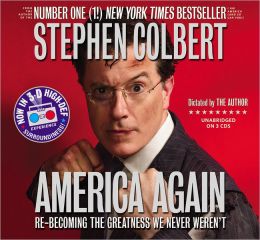

Among the winners of the American Library Association's top awards for children's and YA books, videos and audios, announced yesterday at its Midwinter Meeting in Philadelphia, Pa.:
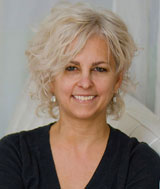 Kate DiCamillo wins the Newbery Medal for Flora & Ulysses (Candlewick), her second Newbery win. She earned her first Newbery Medal 10 years ago for The Tale of Despereaux (also Candlewick), and a Newbery Honor in 2001 for her first novel, Because of Winn-Dixie (also Candlewick). DiCamillo was sworn in as the fourth National Ambassador for Young People's Literature earlier this month.
Kate DiCamillo wins the Newbery Medal for Flora & Ulysses (Candlewick), her second Newbery win. She earned her first Newbery Medal 10 years ago for The Tale of Despereaux (also Candlewick), and a Newbery Honor in 2001 for her first novel, Because of Winn-Dixie (also Candlewick). DiCamillo was sworn in as the fourth National Ambassador for Young People's Literature earlier this month.
 After three Sibert Honors over the years for his picture books, Brian Floca wins the 2014 Caldecott Medal for his Locomotive (Dick Jackson/Atheneum/S&S). Locomotive also received a 2014 Sibert Honor citation. This fall, the book was named as a New York Times Best Illustrated Children's Book. (See our interview with Brian Floca below.) His previous Sibert Honor books are Moonshot: The Flight of Apollo 11; Lightship; and Ballet for Martha: Making Appalachian Spring, written by Jan Greenberg and Sandra Jordan, which also won an Orbis Pictus Award.
After three Sibert Honors over the years for his picture books, Brian Floca wins the 2014 Caldecott Medal for his Locomotive (Dick Jackson/Atheneum/S&S). Locomotive also received a 2014 Sibert Honor citation. This fall, the book was named as a New York Times Best Illustrated Children's Book. (See our interview with Brian Floca below.) His previous Sibert Honor books are Moonshot: The Flight of Apollo 11; Lightship; and Ballet for Martha: Making Appalachian Spring, written by Jan Greenberg and Sandra Jordan, which also won an Orbis Pictus Award.
British author Marcus Sedgwick wins the 2014 Michael L. Printz Award for Midwinterblood (Roaring Brook/Macmillan). Australian author Markus Zusak wins the 2014 Margaret A. Edwards Award for lifetime achievement in writing for young adults (citation includes: The Book Thief and I Am the Messenger, both Knopf/Random House; Getting the Girl and Fighting Ruben Wolfe, both Arthur A. Levine/Scholastic). Brian Selznick, the Caldecott-winning author-artist of The Invention of Hugo Cabret (Scholastic), will deliver the 2015 May Hill Arbuthnot Honor Lecture.
For a complete list of award winners and honorees, click here.
 Yesterday the Seattle City Council unanimously voted to support Seattle's bid to become a UNESCO City of Literature. Seattle would be only the second U.S. City of Literature, after Iowa City, Iowa. There are six other Cities of Literature around the world: Edinburgh, Scotland, Dublin, Ireland, Reykjavik, Iceland, Norwich, England, Krakow, Poland, and Melbourne, Australia.
Yesterday the Seattle City Council unanimously voted to support Seattle's bid to become a UNESCO City of Literature. Seattle would be only the second U.S. City of Literature, after Iowa City, Iowa. There are six other Cities of Literature around the world: Edinburgh, Scotland, Dublin, Ireland, Reykjavik, Iceland, Norwich, England, Krakow, Poland, and Melbourne, Australia.
The Stranger reported that council member Nick Licata, who introduced the resolution, praised local author Ryan Boudinot for accumulating a long list of sponsors for the bid, including the American Booksellers Association, the American Library Association, the Academy of American Poets and Nancy Pearl. Licata said, in part, that the designation of Seattle as a City of Literature would help "Seattle's readers and writers to engage more deeply in the world's literary traditions," and "for our city to contribute to a community of creative cities around the globe."
Boudinot will soon travel to several Cities of Literature in Europe, seeking their support. In March, he will submit the application, which will include written and video testimony. The public will be allowed to comment and participate in the process.

"The energy and enthusiasm just fires me up," added Neale, noting with a smile that booksellers in the U.K. tend to be "just a little bit more gloomy" than their American counterparts.
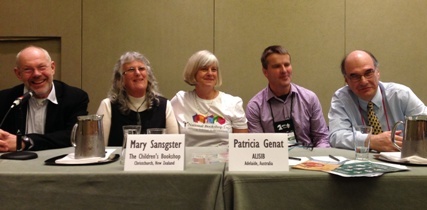 |
|
|
From left: panelists Mats Alstrom, Mary Sangster, Patricia Genat, Patrick Neale; moderator Oren Teicher. |
|
Recently U.K. indies have been reporting much more promising figures than in the past five years, attributable in some part to the countrywide Books Are My Bag campaign. The campaign, which culminated on September 14 with bookshops around the U.K. hosting parties, received £80,000 in financial support from U.K. publishers. More than 300,000 Books Are My Bag tote bags were given away, and Neale even managed to get Prime Minister David Cameron to pose for a picture with a tote bag in front of his store. (Cameron is a regular customer.) Neale also pointed to setting up bookstores and cafes at music and food festivals as a surprisingly lucrative, growing trend.
"You've got to go where the customers go," said Neale, whose own store is now involved with five different festivals.
Patricia Genat, the president of the Australian Booksellers Association, reported that Australian booksellers have begun to "pull ourselves out of it." In a recent survey of 200 Australian bookshops, 69% of responders said that Christmas trading was much better in 2013 than the previous year. Since 2011, the austral ABA has spearheaded National Bookshop Day; the fourth such celebration will come later this year. It grew out of the "doom and gloom" that settled on the book market in 2009, she said.
Genat emphasized the importance of reaching out to the "unliterary community," along with the literary community, when organizing promotions such as National Bookshop Day. The ABA wants to make sure that "everybody could come into a bookstore and feel comfortable about the process." People who do not read regularly, she insisted, "should read and could read, if we only invited them into the store."
Although the New Zealand book market is "not doing so well overall," there were encouraging reports from some bookshops around the country, said Mary Sangster, owner of the Children's Bookshop in Christchurch, and president of Booksellers New Zealand. The feeling among booksellers was positive, she related. They felt they were "heading to the right place," and Sangster suggested that New Zealand indies are "where you guys were about a year ago."
Mats Alstrom, owner of Djursholms Bookshop, Stockholm, Sweden, and board member of the Swedish Booksellers Association, offered insights into the Swedish book market. There are some 350 bookstores for a language area of about 10 million people, Alstrom said, and one large chain holds about 70% of the bricks-and-mortar market; essentially, Sweden has about 100 indie bookstores. Shortly after joining the European Union, Sweden saw a boom in bookselling due to lowered taxes. In the five or six years since, Alstrom said, Swedish booksellers have lost 20%-30% of that business. To combat that, and a decline in reading among children and teens, the SBA is organizing a celebration called World Book Week to coincide with World Book Night on April 23.
When asked what strikes them as the biggest differences between booksellers in their countries and American booksellers, the panelists gave a variety of answers.
Sangster was impressed, she said, by both the amounts of events that American booksellers run and the emphasis placed on them: "We had one author visit last year," she said. "Because we're at the end of the earth apparently, publishers say it's too expensive to send authors. You folk are really fortunate with the number of authors you can build events around."
Alstrom agreed, suggesting that Sweden is at the other end of the earth and as a result similarly starved for authors. An attendee of four Winter Institutes, Alstrom said that the "first thing" he learned was the importance of events. He added that though he does not discount books generally, children's books are always at a discount at his store. The policy resulted in a sixfold increase in children's book sales.
"I've spent an awful lot of money on books since I've been here," said Neale, which he attributed to "the curatorship on display" in many U.S. indies. "I want to get back and do that. I need to get these great books back in my shop.
"I just wanted to say that I've got massive reassurance from being here," Neale added, as the panel wrapped up. --Alex Mutter

J.P. Leventhal, founder of Black Dog & Leventhal, said that his press got its start in a big way with bestsellers that included Skyscrapers (18 inches high) and The Complete Cartoons of the New Yorker. Having learned everything he knows about books from the remainder side of things, Leventhal said that the press is very focused on the three p's: pricing, promotion and placement in its publishing program. He pointed to several moderately priced, heavily illustrated titles on its most recent and upcoming lists, including The Secret Language of Color by mother-and-daughter team Joann and Arielle Eckstut; The Secret Language of Animals by Janine M. Benyus; and National Wildlife Federation's World of Birds by Kim Kurki.
The latter two titles are powerful tools "for kids to get to know to love nature," he continued. While showing a few amazing slides of animal communicating in nature, he commented: "When elephants come together, it's a high five."
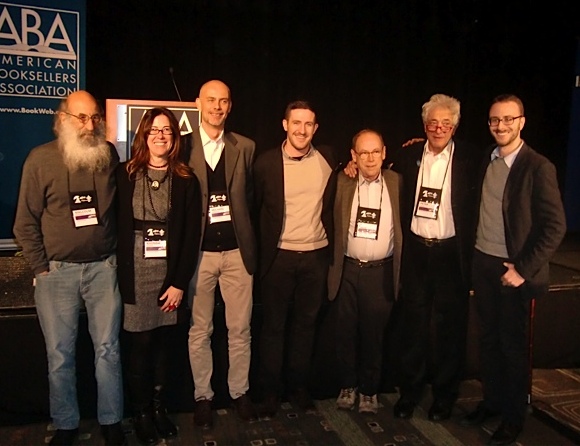 |
|
|
(l to r:) Malcolm Margolin, Heyday Books; Rhonda Hughes, Hawthorne Books; Michael Reynolds, Europa Editions; Patrick Thomas, Milkweed Editions; J.P. Leventhal, Black Dog & Leventhal; Peter Mayer and Mark Krotov, Overlook Press.
|
|
Michael Reynolds of Europa Editions recalled that 10 years ago NPR's Maureen Corrigan called Jane Gardam "the best British writer you probably never heard of." Today, he said, Gardam might still be the best British writer, "but very few booksellers have never heard of her." In May, Europa--which has sold more than 200,000 copies of Gardam's books--is publishing The Stories of Jane Gardam and has discovered that, at 84, the author remains "somewhat of a rock star."
Reynolds also presented a debut novel, Revolution Baby by Joanna Gruda, a rare acquisition by the company's founder, Sandro Ferri. A World War II story based on the author's father's life, Revolution Baby is being compared to Life Is Beautiful and The Boy in the Striped Pajamas. "It's a very, very sweet book, with one of the most charming young narrators that I have read in the long time," Reynolds said.
Rhonda Hughes, founder of Hawthorne Press, admitted she was shaking as she made her Winter Institute debut as a presenter. "You all inspire me so much to keep publishing and doing what I do," she said. She gave a nod to the press's early bookstore supporters, like Paul Ingram at Prairie Lights, Iowa City, Iowa; and to distributor PGW's Elise Cannon, who suggested Hughes ask Chuck Palahniuk to expand a blurb for Monica Drake's novel Clown Girl into an introduction (which he did). The book sold more than 20,000 copies, and film rights went to Kristen Wiig. Hughes also credited indie support for the success of Hawthorne titles The Well and the Mine by Gin Phillips, and two by Lidia Yuknavitch: The Chronology of Water and Dora, a Headcase, which was just optioned for film by Big Easy Productions.
Looking forward to this spring, Hughes talked about I Loved You More by Tom Spanbauer--a love triangle being compared to Jeffrey Eugenides's The Marriage Plot and Jonathan Franzen's Freedom, except with a gay central story--and Ariel Gore's memoir, The End of Eve. Gore is launching an indie-only 16-city promo tour from her neighborhood store, DIESEL in Oakland, Calif.
Malcolm Margolin, who founded Heyday Books in Berkeley, Calif., 40 years ago, expanded on WI9 opening keynoter Dan Heath, who had introduced the acronym WRAP. "I thought, what four-letter word would I put forth?" wondered Margolin. "F is for fun," he said. "L--fooled you, didn't I?--is for local." (Heyday is a regional publisher, he said, "because I love to know the people I deal with.") He continued: A is for the Hindu concept of Advaita, and W for the willingness to take risks. He may have spelled FLAW, but Margolin was flawless as he gave booksellers a preview of two of Heyday's signature, beautifully illustrated titles: Scrape the Willow Until it Sings: The Words and Work of Basket Maker Julia Parker by Deborah Valoma and Looking at Art, the Art of Looking, featuring the photography of Richard Nagler, with a foreword by Margolin.
"Independent booksellers are the vanguards of debut literature," proclaimed Patrick Thomas, adding that without them, places like Milkweed Editions "would not exist." The indie press editor went on to pitch some titles from the spring list: Inappropriate Behavior: Stories by Murray Farish, who is being compared with Adam Johnson and provides one of the best author audio bits on the publisher's website, Thomas said; Stilwater: Finding Wild Mercy in the Outback by Rafael de Grenade, about how the author volunteered her services on an abandoned cattle station in Australia "the size of Rhode Island"; and Things That Are: Essays by Amy Leach, who sold 5,000 copies of a previous book after Milkweed brought her to the WI Indie reception in New Orleans in 2012.
Peter Mayer said he's spent 20 "happy years" at Penguin and 42 years as the publisher of Overlook Press, the latter named for both the mountain in Woodstock, N.Y., and the press's talent for publishing books that might be overlooked by larger houses. These include 97 P.G. Wodehouse titles and the Freddy the Pig children's books (300,00 copies sold), plus back-in-print titles like True Grit and Psycho. Although Mayer said he had never done a puzzle in his life, Overlook was the first to publish sudoku in the U.S.
Like a good publisher, Mayer shared both the glory and the floor with his staff--he introduced editor Mark Krotov to present Wonderkid, the new novel by Wesley Stace (aka singer-songwriter John Wesley Harding). Of course, Krotov joked, he didn't tell his boss he'd always wanted to be a rock star, and emphasized instead that Wonderkid was a rock 'n' roll book by someone who knows what he is writing about--except that the band in Stace's novel is a kiddie rock band that "still wants sex, drugs and rock and roll," but whose audience is either "breast feeding or being breast fed."
Year after year, the indie publisher-bookseller connection proves a great way to wrap up the buzz of Winter Institute. --Bridget Kinsella
Jose Emilio Pacheco, a poet, novelist, journalist, essayist and literary critic who "came to be seen as a leading representative of the generation of Mexican writers that came of age in the late 1950s and 1960s," died Sunday, the Associated Press reported. He was 74. Pacheco won the Cervantes Prize in 2009.
Universal Studios Florida gave the media an early peek at The Wizarding World of Harry Potter--Diagon Alley, opening this summer in Orlando to join the popular Hogsmeade attraction that made its debut in 2010. After a tour, CNN reported "guests will feel like they've stepped onto the London film set, complete with the popular wizarding pub The Leaky Cauldron, several iconic shops and a marquee roller coaster-type attraction based on Gringotts, the goblin-run bank from the series."
"Park operators from around the world were impressed by the immersive experience Universal created and the meticulous attention to detail they used to bring the Harry Potter stories to life," said David Mandt, v-p of communications for the International Association of Amusement Parks and Attractions. "There is great anticipation within the industry to see how Diagon Alley will build on that success."
Although J.K. Rowling has not toured the site yet, Mark Woodbury, president of Universal Creative, said she "has been involved as usual in the development process and has been a great supporter throughout the process as she was in the original in 2010. Just a delight to work with and a wonderful author. And someone we are eternally grateful to for creating a body of fiction that is so rich that gives us an opportunity to develop what we've been able to do."
After 46 years in publishing, Macmillan v-p, senior director of international sales Judith Sisko is retiring after this year's London Book Fair in April. Before joining Macmillan 22 years ago, she worked at Holt, W.H. Smith and Simon & Schuster.
---
Amy Kaneko has been promoted to v-p of sales and marketing at Weldon Owen. She was formerly v-p of sales and business development. Before joining Weldon Owen seven years ago, she was executive director of marketing at Chronicle Books.
Ingram Publisher Services has added two publisher clients:
Köehler Books, Virginia Beach, Va., which publishes works of fiction in genres that include contemporary women, YA, Christian and mystery; how-to; and self-help nonfiction. IPS is handling sales and distribution in the U.S. and Canada.
Linden Publishing, Fresno, Calif., whose three imprints are Linden Publishing, which publishes books, plans and DVDs for woodworkers; Craven Street Books, which specializes in California history; and Quill Driver Books, which focuses on general nonfiction, including writing, business, marketing, technology, health and personal development. IPS is handling sales and distribution for books and gift items in the U.S. and Canada.
Today on Fresh Air: McKenzie Funk, author of Windfall: The Booming Business of Global Warming (Penguin Press, $27.95, 9781594204012).
---
Tomorrow morning on CBS This Morning: James Carville and Mary Matalin, authors of Love & War: Twenty Years, Three Presidents, Two Daughters and One Louisiana Home (Blue Rider, $28.95, 9780399167249).
---
Tomorrow on NPR's Diane Rehm Show: Nancy Horan, author of Under the Wide and Starry Sky: A Novel (Ballantine, $26, 9780345516534).
---
Tomorrow on the View: La La Anthony, co-author of The Love Playbook: Rules for Love, Sex, and Happiness (Celebra, $24.95, 9780451466440).
---
Tomorrow night on Jimmy Kimmel Live: Norman Van Aken, author of No Experience Necessary: The Culinary Odyssey of Chef Norman Van Aken (Taylor Trade Publishing, $24.95, 9781589799141).
ABC has greenlighted a pilot order for The Astronaut Wives Club, based on Lily Koppel's novel. Deadline.com reported that the pilot episode for the project, from Josh Schwartz and Stephanie Savage's Fake Empire and Michael London's Groundswell Productions, will be written by Savage.
 Brian Floca's impeccably researched and illustrated information books have long been honored for their accuracy (with three Robert F. Sibert Honor Awards given to "the most distinguished informational book). With Locomotive, he becomes "the artist of the most distinguished American picture book for children," as winner of the 2014 Caldecott Medal. This majestic picture book follows one family from Omaha, Neb., to Sacramento, Calif., as they travel the route of the Transcontinental Railroad. The book also received a 2014 Sibert Honor.
Brian Floca's impeccably researched and illustrated information books have long been honored for their accuracy (with three Robert F. Sibert Honor Awards given to "the most distinguished informational book). With Locomotive, he becomes "the artist of the most distinguished American picture book for children," as winner of the 2014 Caldecott Medal. This majestic picture book follows one family from Omaha, Neb., to Sacramento, Calif., as they travel the route of the Transcontinental Railroad. The book also received a 2014 Sibert Honor.
Congratulations!
Thank you so much!
Did you have a highball to celebrate? ["Highball" is an old railroad signal to indicate that the way is clear; that's where the drink comes from.]
Ha ha ha! Not yet!
Locomotive won a Caldecott Medal and a Sibert Honor. Is it especially gratifying to be recognized for both your artistry and your expertise and accuracy?
I was always trying to make a picture book, and also trying to relate the story of the Transcontinental Railroad, so to be recognized on both levels is very gratifying.
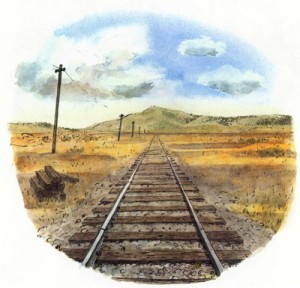 Do you think that growing up in Texas fostered your appreciation for wide-open spaces? Your books inspire such emotional responses from readers--with the image of the plains out the train windows in Locomotive, Buzz Aldrin's view as he looks back at the earth in Moonshot, the landscape of the hills in western Pennsylvania as the wedding backdrop in Ballet for Martha.
Do you think that growing up in Texas fostered your appreciation for wide-open spaces? Your books inspire such emotional responses from readers--with the image of the plains out the train windows in Locomotive, Buzz Aldrin's view as he looks back at the earth in Moonshot, the landscape of the hills in western Pennsylvania as the wedding backdrop in Ballet for Martha.
I think it must have. Going from Texas to New England and then to New York--I don't want to get too much on the couch about it--but I do feel, when I'm back in Texas, the openness of it, and it's great.
You've talked about your passion for research, and how it's led the shaping of Locomotive's narrative in unexpected directions. Would you say that your research has also led your artwork in unexpected directions?
I've never thought of myself as a very technical person, but in trying to show these journeys, I like to make them possible, and trying to draw them has led me to try to understand how they work. I started Moonshot not even knowing whether I was going to try to get the craters on the moon right, or if anyone would even care. The more I researched, the more those elements became meaningful to me, and the more I wanted them in the book.
In the very early drafts of Locomotive, I had in mind that we wanted mountains, a tunnel and a bridge. I put those into the book in whatever order, and it became the landscape of the Transcontinental Railroad. Then it became a particular bridge and a particular tunnel and a particular range of mountains, then the most interesting bridge and the most interesting tunnel.
In one of your blog posts about Moonshot, you discuss "murdering your darlings," in this case, killing off an LP of Bob Dylan's Nashville Skyline (his spring 1969 release), and then admitting that you "miss[ed] Bob." Was there anything you had to take out of Locomotive that you miss?
Originally, I had a drawing of a robber baron that Dick [Jackson] and I liked a lot. But he didn't fit into the narrative. The book is about traveling on and operating the train. He was a type I had in my mind, and he didn't grow out of the people on the [Transcontinental Railroad] at the time. He got cut and I missed him a little, but that was for the best. [The lines appear here:]
And far away,
the man who owns the railroad,
who buys the land, who makes decisions.
Hard work, too, he would say!
(But he would not lift a hammer, no,
he would not shovel coal.)
Your first book for children--City of Light, City of Dark (1993)--was written by Avi, to whom Locomotive is dedicated. How did that project come to be?
That came to me because Avi had a novel he'd written, and at some point decided he wanted to publish it not as a novel but as a graphic novel. He just wrote a blog post about it. Avi got in touch with David Macaulay, who was teaching at RISD [the Rhode Island School of Design], and Macaulay introduced me to Avi. I did some sample chapters, and Avi sold the book to Dick [Jackson].
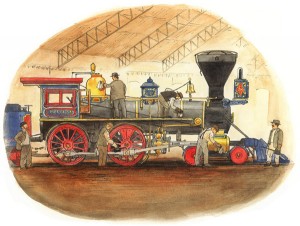 Did you always think you would be an artist?
Did you always think you would be an artist?
I think I always wanted to be, but I don't think I knew what kind of artist I wanted to be. I always knew I loved drawing, but I didn't know what I'd be able to do with it.
Why do you prefer to work in watercolors?
I've always felt like more of a drawer than a painter. With watercolors, I get to start with pen-and-inks; that appeals to me. I love the human quality of them, how visible the media is. I love that you can see some of the mistakes the artist has made--hopefully not too many.
Tell us how you came to children's books.
It was really through that project [City of Light, City of Dark]. In [college], I was doing a lot of cartooning, and I was interested in words and pictures. David Macaulay taught a class at RISD, and I took it, and that led to meeting Avi, and I did that first book with Dick, and then got a manuscript from Dick, and then I started sending stories to him.
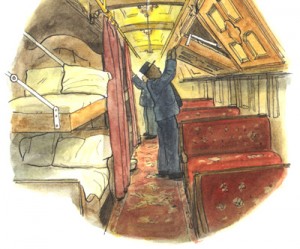 What was the first book you both wrote and illustrated?
What was the first book you both wrote and illustrated?
It was called The Frightful Story of Harry Walfish. You see why it's gone out of print. Too many words.
Dick Jackson edited what we like to call your triptych--Lightship, Moonshot and Locomotive. What has it been like to collaborate with him?
There's not enough wonderful things to say about Dick Jackson. There's intelligence, humor, his sense of what works in a book, and the level of trust and knowing each other we've developed over 20 years. I'm not afraid to take something to him, whether I think it's working or not. We think a lot of each other and each other's work and that's a huge part of the process, I think. --Jennifer M. Brown
A 10-book longlist has been announced for the $15,000 Lionel Gelber Prize, which honors the "the world's best nonfiction book in English on foreign affairs that seeks to deepen public debate on significant international issues." The shortlist will be released February 10, and a winner named March 31.
"These are books of striking originality and insight," said jury chair William Thorsell. "They range from ground-breaking works on diplomatic history to new perspectives on the dynamics of the world in the age of the internet, growing affluence and changing players. Readers seeking to better comprehend the roots and course of our international system will be deeply indebted to these authors."
The Sun and Other Stars by Brigid Pasulka (Simon & Schuster, $26 hardcover, 9781451667110, February 4, 2014)
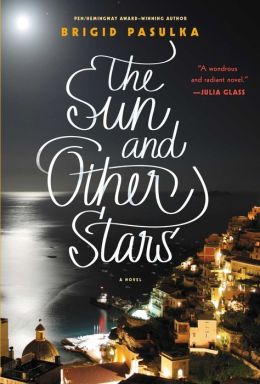
Etto's life came unmoored when his twin brother, Luca, died in a terrible accident and his mother drowned less than a year later, a probable suicide. The 22-year-old no longer feels at home in his small Italian villagio of San Benedetto; his relationship with his father suffers as much as every other aspect of his life, even though the two work together in the family butcher shop.
San Benedetto's citizens, including Etto's father, thoroughly love calcio--the Italian term for soccer, "or as most people here say it when they're trying to speak English," Etto tells us, "SO-chair, with a little roll on the r and a couple of kilograms of reverence in their voices." Etto, however, has never cared for the sport. But when accusations of cheating bring Ukrainian-born Yuri Fil, Etto's father's idol, to San Benedetto to hide out from the paparazzi, Etto finds himself befriended by the Fil family and finally swept up in the joy of the game. Although he initially accepts the offer to join the family's soccer practices just to impress Zhuki, Yuri's beautiful, fiery, and inscrutable younger sister, Etto's confidence on the field and in life slowly grows. When Yuri Fil visits Etto's starstruck father, events are set in motion that will bring the celebrity and the villagers together and ultimately give Etto the chance to mend his broken family and perhaps find true love.
Charming and hopeful, Etto's gradual reawakening to life and his purpose in it doesn't require soccer enthusiasm for readers' enjoyment, although the characters' joy in the sport may prove infectious. The profundity of grief, the alternate angst and joy of young love and the struggle for understanding across generational divides form the bricks of the story; soccer is simply the mortar joining the themes. Etto's coming-of-age reflects the conflict most of us feel when trying to find our path in life. If only all of us were lucky enough to have an Italian town full of quirky neighbors and friends to help us along the way. Fortunately, Pasulka creates a charming world with enough depth to allow us to have the experience vicariously. --Jaclyn Fulwood, youth services manager at Latah County Library District and blogger at Infinite Reads
Shelf Talker: A young Italian man who's lost his mother and brother reconnects with his family and villagio with the help of a professional soccer star.